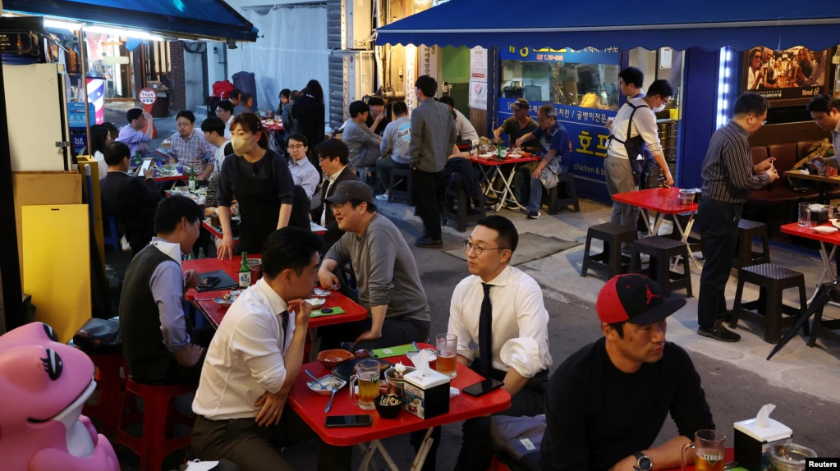South Korea’s recent decision to ease many of its COVID-19 restrictions has some office workers feeling more concerned than happy.
That is because the end of social distancing means a possible return of “hoeshik.” Hoeshik are after-work meal gatherings that are considered part of South Korean work culture. Employees do not get paid during hoeshik. The events often end very late at night.
Jang is a 29-year-old office worker. She works and lives in Seoul. She only wanted to be known by her last name so that she could speak freely about her employer. Jang said she thinks that hoeshik is out-of-date. She said such gatherings take up too much of an employee’s free time.
“Hoeshik is part of your work life, except it’s unpaid. The worst part about the after-work dinners is that you don’t know when it’ll end,” Jang said. “With drinks, it could really continue well into the night until who knows when.”
During the pandemic, Jang was able to spend her nights the way she wanted to. She cleaned the house, made herself dinner and exercised.
Even before the pandemic, many young South Koreans did not support hoeshik very much. They also did not necessarily like other work-related events such as company trips and hikes.
The pandemic prevented companies from holding hoeshik events. And it may have permanently changed hoeshik culture. Almost 80 percent of people questioned for a recent survey by Incruit Corp said their companies’ hoeshik culture has changed. Ninety percent of those respondents said they were pleased with the changes.
Suh Yong-gu is a marketing professor at a Seoul women’s university. Suh said, “Now that employees know what it’s like to have off-hours kept for themselves, companies won’t be able to fully restore the old after-dinner and weekend gathering culture.”
Kim Woon-bong is 30 years old. He started a city government job during the pandemic. He said that he feels lucky that he did not have to take part in the required hoeshik culture because of the social distancing rules.
“I actually liked meal gatherings held during lunch hours, because I knew they would end at 1 p.m.,” he said. “I am cautiously hoping the company dinner culture will change now that it has been almost gone for two years.”
Suh said that even though younger employees do not enjoy after-work dinners and socializing, many older employees still think that the dinners are necessary to form connections with co-workers.
“It will be yet another conflict between the old and new generation,” Suh said.
Some companies are giving employees the choice to work from home or go into the office on some days. SK Telecom is one such company. It is letting employees choose between working from home or working in the office in small, socially distant work areas.
One company official, who did not wish to be named, said there is no set guidance on company dinners. But, the official added, “they will be less frequent when many of our employees are working from home.”
I’m Faith Pirlo.
Soo-hyang Choi reported this story. Faith Pirlo adapted it for VOA Learning English.
____________________________________________________________________
Words in This Story
out-of-date – adj. old-fashioned or not relevant to today
hikes – n. a long walk especially for pleasure or exercise
respondents – n. a person who gives an answer to a question, especially as part of a public opinion study
restore – v. to return (something) to an earlier or original condition by repairing it, cleaning it
cautiously– adv. careful about avoiding danger or risk
What do you think of the young South Koreans’ concerns over returning to work and hoeshik culture?
